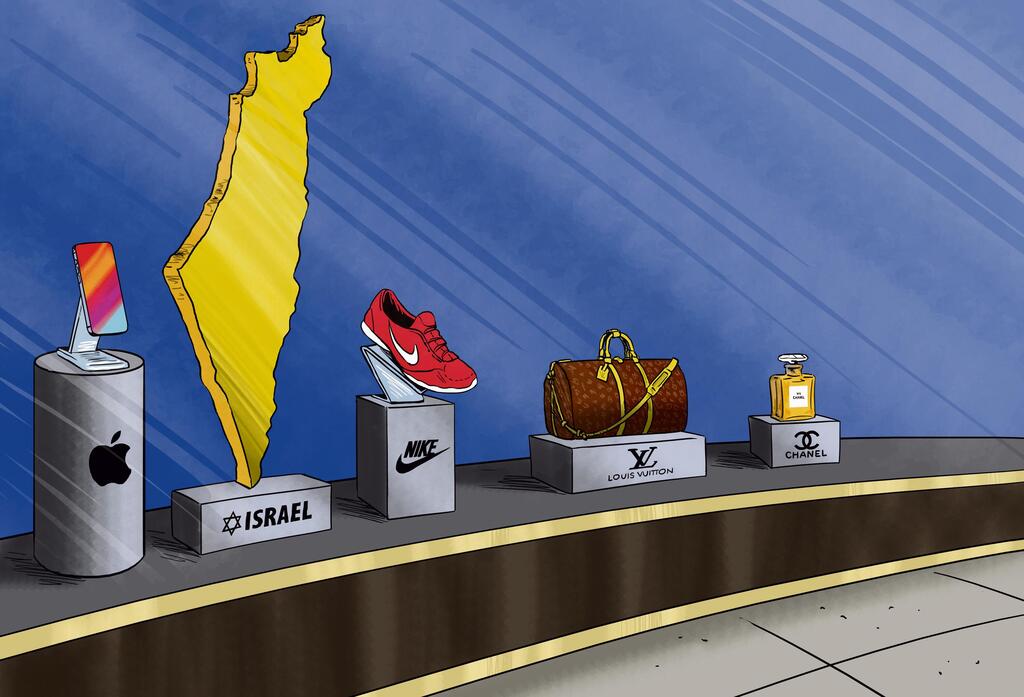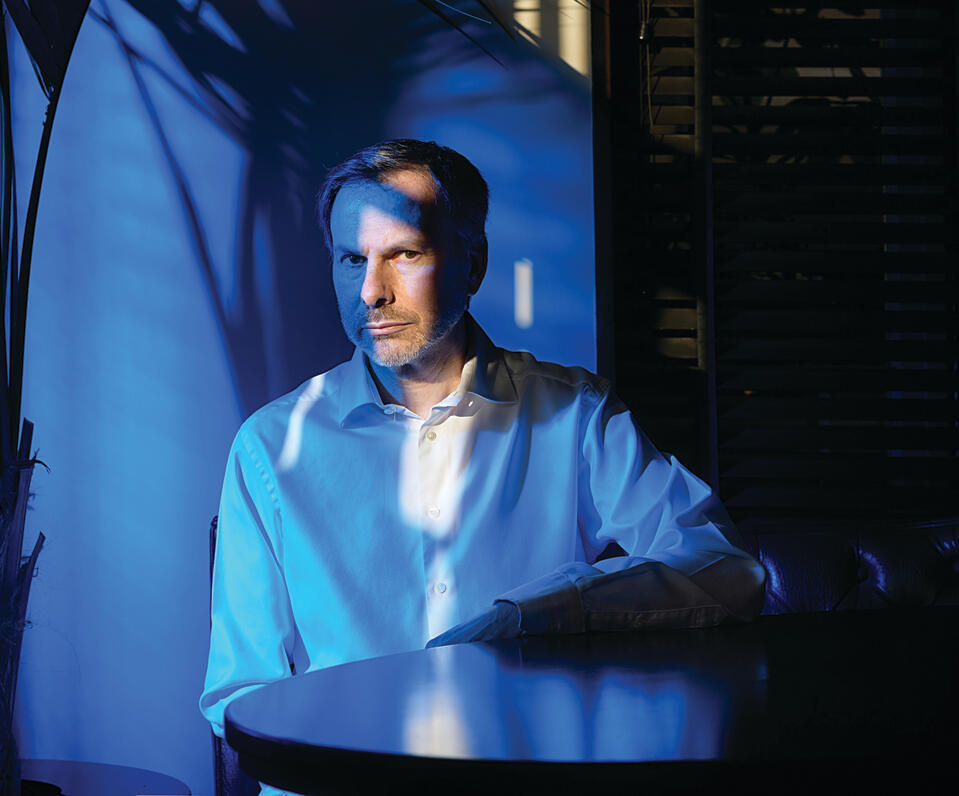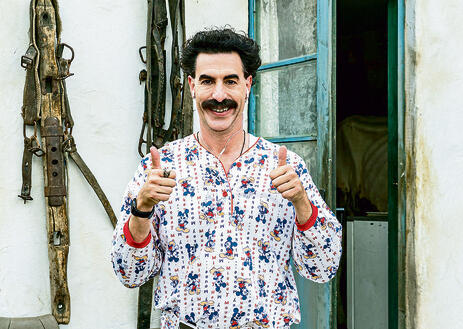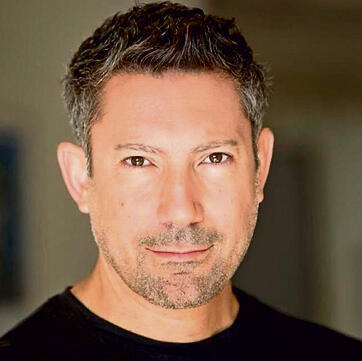Getting your Trinity Audio player ready...
What can be done about us? That is the question. What can be done to make the world listen, nod in agreement, and say: "Yes, Israel, we completely understand you. We fully support you. We send you positive thoughts just before we fall asleep."
What can be done to make the taxi driver in Paris just a little less silent and hostile when we reluctantly tell him we're from Israel. What can be done to make people understand us, because right now it feels like we're an awkward teenager holed up in his room, making a lot of noise, grumbling occasionally and feeling misunderstood.
Hasbara, yes. That word so distinctly Israeli it has no exact English equivalent, and Simon Anholt, probably the leading expert in the world on such matters, doesn't believe in Hasbara. Hasbara is for amateurs.
“One government after another has fallen into the classic trap of thinking that this is all about Hasbara,” he says, “that it's just about arguing our case in the court of international opinion and spending money on narratives and words and claims and arguments to try and prove that we're right. It doesn't work.
“If you play the same game as your enemy and you're doing sort of street fighting in the sense that they bring a celebrity, we bring a celebrity, that doesn't solve the problem. You can't kill them because this is in virtual hyperspace. The interesting thing about this info war is that, by definition, it cannot be won.”
Believe him. The man does this rare job for a living – he is a 63-year-old Briton who has worked with 64 countries on their rebranding. This profession exists, and Anholt practically invented it. He is the most respected figure in the world today when it comes to the concept he himself dislikes using – "nation branding."
“We have started to regard countries as if they were brands - stupid, childish stereotypes. This is one of the side effects of globalization. That's actually why I originally coined this awful term, ‘nation branding.’ I was being ironic,” he admits.
It has become clear that nation branding is one of the most critical tasks for governments and peoples, making Anholt a close advisor to heads of state and policymakers. He doesn’t take this lightly; for him, the work is not merely "public relations" but actual, tangible change. “Israel's got big image problems. My version of that is Israel has a big reality problem. The two things are not separate,” he clarifies.
After creating two influential global indices – the "Nation Brands Index," which measures how the world perceives each country, and the "Good Country Index," which assesses how much a country contributes to the global good – Anholt has become the most sought-after advisor in the less popular parts of the world.
“The only thought that's in people's minds about Israel is Israel equals conflict, conflict equals Israel, and when you get to that stage where you become identified with your key challenges, that's when you've got a real identity problem because it's almost impossible to force public opinion to make that separation. That basically means it becomes perceived as a kind of monolith. It's just a lump of bad and people don't want to, don't know how to and don't care to pick it apart.
“If you say to them, ‘you know, there are quite a lot of Israelis who actually don't approve of what their government is doing in their name in Gaza,’ to them, ‘it's complicated s***, I don't want to know about that. I just want to know that there's this big bad bully called Israel, and I hate them.’”
He says he won't go anywhere near Israel if approached by the government. “I have spoken to the Israeli government on two or three occasions in the past 20 years and through conversations it's become obvious that they were really only interested in finding out about new techniques and they thought that I would be able to help them win the war of opinions, the battle of hearts and minds, and on every occasion I basically said, ‘you know, that's really not what I do.’
“One of the things that I've observed on a number of occasions in the past is that countries with troubled images that start doing PR, they start sending out messages. They often end up in a worse place than they started. And this has been known in media studies since the 1960s - countries with bad images would do better to keep their stupid mouth shut.”
Have you seen our eloquent representatives, like Eylon Levy or Noa Tishby?
“Your problem is not that people don't like you, it's that they don't want to like you. That's where they are at the moment. They don't want to like Israel, and if you don't want to like Israel, you are not going to listen to any of those guys when they're talking or if you do listen to them, you're looking for an opportunity to say, ‘that's a lie, that's propaganda, he's an idiot, he's being paid,’ etc. So, it is entirely futile. It’s based on a very charming and very naive view that it's possible to change people's minds. Nobody is prepared to have their mind changed. You're preaching to the choir, and maybe there's some virtue in doing that, but that cannot be your number one tactic.”
The battle of hearts and minds
Last month, he visited Israel for a week, his first time here. He met with President Isaac Herzog and top business and political leaders willing to meet with him, and he liked what he saw. “You have some brutal architecture in this country. You also have something that reminds me of southern Italy. It's like a cross between Miami, Bali and some third-world country. I would love to come back," he shares.
The project he is set to lead, Brand IL, began as an initiative by a Zionist South African billionaire who prefers to remain anonymous, in collaboration with strategic advisor Moti Sharf. Its ultimate goal, which currently seems nearly impossible, is the comprehensive rebranding of Israel through a long-term, data-driven and research-based process—done properly, once and for all. "This should be the last war," Anholt says, referring to the battle for Israel's image. As for actual warfare, we'll have to manage without him.
Even the image battle appears nearly impossible at the moment. However, Anholt, a seasoned branding expert, an efficient cynic and someone who knows more about the state of the world than any commentator, isn't too concerned about a country whose last organized attempt at self-promotion ended with, "But buy me a printer so we can start," and only deteriorated from there.
He knows our starting point is problematic. “It definitely looks as if the other side has the upper hand at the moment, no question about it. They have the public sympathy vote in many parts of the world, not everywhere, but in many parts of the world and in America, which is what counts for Israel in so many ways, psychologically, morally, sentimentally, but also financially and strategically, so it is a complicated picture.
“Israel is somewhat on the back foot. It is perceived as being the villain, and that's mainly because it's switched from being David to Goliath, and sympathy for the underdog a very deeply rooted in human psychology and the Palestinians benefit from that. And let's be honest, the numbers were really, really, really bad from the Israeli side, the numbers of casualties and so forth. Many times more deaths amongst Palestinians. This is what people see and that's what causes them to judge.”
That's it? Is it just the numbers talking? Nothing beyond that?
“You have to try and put yourself inside the minds of people who don't know anything about this. It's a remarkable modern phenomenon that people around the world are suddenly so damn interested in the politics of other parts of the world. We've reached a stage in history where everybody is expected to have an opinion on every damn topic, and irrespective of whether they know anything about it or not. So knowledge and opinions become permanently separated. Everybody's expected to have an opinion, so you have to buy a ready-made opinion, because otherwise, it means you have to work. You have to gain knowledge, which is time-consuming and so forth. You have to sit down and read history and figures. Where do you get it from? Which information can you trust? Have you got the time? Not worth it. Just go to the nearest store and buy an opinion and you buy an opinion from what looks like the tribe you associate yourself with. Identity is the answer to everything in the 21st century.”
And they don't identify with us as much.
“What Israel is suffering from is the combination of polarization, driven by tribalism, driven by social media algorithms. What tends to happen is that people, especially young people, who have a very, very strong moral sense, they haven't yet become corrupted by the reality of the world. They're very pure in that respect. There's right and there's wrong. And what social media is doing to them is pushing them to the extremes and it's doing what social media always does, which is to turn everything into a kind of idiotic binary equation. You're either pro-Palestine or you're pro-Israel.
“I like the look of the underdog because I feel sorry for them And the big guy is the bad guy in a situation like that but also because of subliminal antisemitism. It's so discrete and so buried deep in the culture of so many societies around the world that I think the people who feel it don't even know they've got it there. They would deny most vigorously that they were antisemitic.
If you're faced with that dilemma. God, which tribe do I belong to? So, therefore, do I carry the card for Palestine or for Israel? That pattern, that archetype, don't trust the Jews, that will come into play. That's one of the main reasons why the pro-Palestinian mob seemed to be along with the David-Goliath story. I think it's one of the main reasons why they seem to have the advantage at this point.”
Anholt begins with the key positive point of his "Nation Brands Index," an extensive annual public opinion survey that includes around 40,000 respondents worldwide and "measures perceptions of about 60 countries in high resolution."
He notes that Israel's image did not collapse due to the war – it remains poor, but currently ranks 46th out of 60 countries. “Israel's image is so strongly associated with conflict anyway, that more conflict, even though it's dramatically worse than previously, it's still the same subject.”
So why do we feel there is a dire crisis in our image right now?
“We have to try and distinguish between the overall base image of Israel and how it's perceived in the longer term by people, how much it's admired or not admired. Between that and the current battle for public opinion that's going on in American universities and in the media, and especially in social media. So if you're looking at that, it looks like all hell has broken loose. Nuclear war. Israel is currently in the middle of the most violent infowar in history and the interesting thing is that both sides are convinced that they're losing. Both sides are convinced that the other side outguns them massively. Both sides are convinced that there are secret sources of money funding the other side to dominate. In a way, it's actually quite touching.
When I speak to Israelis, they say ‘we don't stand a hope in hell. We can't compete against the money that there is in Iran paying its proxies to fire up troll farms in Russia to fight this and kill us and nobody listens’ and so on. And when I talked to Muslim and Palestinian friends, they say ‘we don't stand a hope in hell because Israel is so sophisticated. They dominate this space. They've got the technology, they've got all the money’ and so forth.”
It's somewhat comforting to know that we're not the only ones feeling like we're losing. However, when Anholt looks ahead at how to lift Israel off the ground and transform it into a country perceived as "good" within a few years, he emphasizes that, as with any other case, we will need to start with real work – policies and projects – and not just rhetoric.
“I made a discovery about 10 or 15 years ago now. I run this survey because it's a big question and we speak to a lot of people. It accumulates a lot of data and in around about 2012 I discovered that I collected 1.5 billion data points, which is big data. So I thought, ‘OK, this is the time to mine that database and see if I can find out the million-dollar question, which is what actually makes a good image.
“What I discovered was that that the good image of the country has about 5 possible drivers and four of those are the sorts of things you would expect. It looks nice, the clothing, the cuisine, people's faces - that's tremendously important. It's the way we engage with the world, especially when you have Instagram and everything.
“Things like that, they all matter, but by a huge margin, more than five times more than any other factor, the thing that people care about most is does the country contribute something to the international community? Do I feel glad that it exists? Is it a responsible player? Is it tackling or helping to tackle the things that I worry about for the next generation? For my children, for my grandchildren, climate change, pandemics, human trafficking?”
Do people actually take this into account about other countries?
“Absolutely. This is what the UN calls the Sustainable Development Goals. It's just a list of 17 things to feel depressed about when you wake up in the morning, and not surprisingly, all of my surveys show that by and large, this is what most people spend most of their time worrying about. So a country that demonstrates year after year that it's not only thinking about its own population, it's not only thinking about territory, it's also thinking about the things that matter, to me, that's a country I would like. “
Like...?
“Norway, OK? It's got a lot of money, but it's not important, right? It's not a major player. It's a beautiful place, it's not a major problem, and yet it has a massive image way out of proportion to its real significance. It's at least partly, perhaps very significantly, because people have the phrase in their mind, which is something called the ‘Oslo Accords’ and dimly aware that it is something to do with peace in the Middle East and they know that the Middle East is a place where there's not very much peace and they think that Oslo is in Norway and so they love Norway.
“If you think about it, it's actually quite logical. It's pure self-interest. If I live in Eritrea or Chad or Guatemala, I don't care how successful Israel is because it doesn't benefit me. I don't really even care how beautiful it is unless I'm going there on holiday. I don't care whether Israelis are sad because it doesn't affect me. The only thing I care about is whether it deserves its place on the planet, whether it's contributing to the world in which I live.”
So contribute to the world? Is that the point?
“Every single government I've ever come across in the whole of my long career that tries to do this stuff, that is actually the last thing that they do. The first thing they do is start bragging about their assets and their achievements. It's on and on and on about our fantastic educational system and the amazing costumes that elderly people wear in the mountains, and you just sort of think, ‘well, why would I care?’
“Bragging is not a good look. It doesn't make you look like a nice country. It doesn't make you look confident and it certainly doesn't win you any fans. So this is a long answer to a simple question. The simple question is what do we do? What would you do next? What is the route? Well, the route is you have to start asking a different question instead of asking constantly what can we say to make you love us. The question should be what can we do to make ourselves relevant to people's lives in a positive way? What is Israel's gift to the world? Why should somebody feel glad that Israel exists?”
Victim to Leader
Well – I'm embarrassed to tell him again – we've brought drip irrigation and those tomatoes to the world, ICQ, Golda Meir, Gal Gadot, and to a large extent, even Chuck Norris – but Anholt already knows this.
“No matter where you go, people respect Israeli technology. They know about it. It's a shining light in the darkness. It's an obvious comparison, but we have to remember what Germany and Japan did after the Second World War. They were a much worse place than Israel is today. They were pariahs, they were Nazis. They led the return to international favor through the export of high-quality consumer products.
I've got a Braun razor. I drag it over my face every morning. It's closer to me than my wife. And over time, you learn to trust the people who made that thing, and that's the way it works. And that's the same route that South Korea has followed with consumer goods, and I think that Israel has a huge opportunity there. That's a way back into the community of nations.”
Where do we start? How do we change the narrative?
“Narrative is a word invented by PR agencies, and I never know what it means. There used to be a gadget for losing weight which was sort of a vibrating belt and you'd stand on this platform, you put this belt around your waist and it would massage your fat bits really, really fast until they disappear, which somehow never happens. This is a little bit like changing the narrative. The idea that by vigorously massaging what people believe about you, you can make it go away or change is bullshit. If you want to lose weight, you have to eat less and take more exercise in the same way. If you want to change your image you have to change the reality. You have to start behaving differently so that people understand and the behavior that you have to start doing has got to be so unusual, so magical, so dramatic and so relevant to people's lives that they can't miss.”
Like what?
"It has to be unusual enough for the media to really want to write about it. “When I was working for Michelle Bachelet in Chile, one of the things that we wanted to do which felt very important was to try and tell the world beyond Latin America, that Chile is not like a lot of other Latin American countries. It's not full of bandits whose veins are pollinating with boiling tropical blood. You know it's a very sensible, sedate, well-organized country where people wear ties and do business. And so as I was thinking about this, I was taken on a trip to see the observatories in the upper Atacama Desert. It's the biggest collection of the curvatures anywhere in the world, because in Chile they have wonderful clean dry air and I began to discover that the astronomy thing, it wasn't just that that's where the Americans park their telescopes. My simple suggestion was why don't we start teaching astronomy to five-year-olds in Chile? It's the sort of thing a country like that would do, and to their credit they did. They still do it today and that was the story. It's a good story. And then they followed up by having a National Day of Astronomy and all that. And what you find is that nobody can have that thought planted in their heads without suddenly discovering that they've changed their mind a bit about the kind of country it is, and maybe they're not bandits.”
Where can we act in a similar way?
"Try to put together a coalition of interests in Israel who would like to do something fundamentally here, citizen or private sector-led, because how can I say this diplomatically? The government is quite busy at the moment. The last thing Israel should be doing is standing up with its head above the battlements and saying, ‘look at us, we're wonderful’, because it's not going to work. What it needs to be doing is working behind the scenes in the areas that matter. Like for example, the academic networks, deeply shocking what's happening to Israeli universities and their connections with overseas universities. At the moment the door is being slammed in their face, which in academia is the most shocking thing of all, because the international academic and research networks are generally the best functioning part of globalization. And so there I think there's work that can be done, quite honest, humble, straightforward, quiet work. Just to get those networks working again. Networks of networks and communities do the same thing in the business area, the export promotion and trade promotion, investment promotion. Start working on the same thing in culture. Culture is so important to the image of a country. If people know nothing of your culture, then they don't see you as having any kind of national identity kind of personality. So they don't know how to read you. You're a cipher. You're a scary zombie.”
What country in a situation similar to ours has done something like this?
Mexico Is a country that, like Israel, had become identified with its problems. It was only dead bodies hanging from motorway bridges. That was the only thing that anybody was prepared to think about. What I suggested we did was a strategy called ‘Victim to Leader’ where Mexico gives the thing a twist and starts behaving in a certain way that makes people realize that it's not a passive victim of organized crime and drug violence and human trafficking. It's actually a global leader in finding resolutions to these challenges and starting to do loads of international conferences about tackling these issues and we find that public opinion is quite tolerant on this point. If you say to them, ‘hey, what about Mexico being an international expert in resolving those things?’ ‘Yeah, I'll buy that.’”
These are government-level plans, right?
"Correct. Ultimately, a piece of foreign policy, assuming it is creative and bold, can do more for a country than a thousand spokespersons."
But governments change all the time.
"All it takes is one minister with guts to initiate such a policy before they leave, followed by a few others who maintain it, and it will be fine. I don't care if it's not the same government."
The Israel challenge
All this sounds like an ambitious vision for the current nihilistic Israel, but Anholt is not here to preserve the present state; he is here to imagine, and then create, the future one. "Even the most fierce domestic issues can easily be converted into international utility. Being faced with challenges is, after all, something that puts you in the same boat as every other bloody country."
We are in an existential war. Isn't it a bit of a luxury to focus on our global influence right now?
“The idea that it's a luxury, it's not countries at war who raised this one, it's poor countries. They say that's a luxury as we even feed our own population. Why should we be giving away free food to other populations? It's not about giving away free anything to other populations.
Kenya was in the top 30 in the 1st edition. A country with a very small economy. It's if you look at the things that we're measuring, it's much more about how open and how imaginative you are in how you harmonize your domestic and your international needs. So Kenya can rank very high in the index, even though it's the recipient of aid, because it spends that aid wisely. You don't get more marks for giving it than for receiving it.”
It is evident that the Israeli challenge - heavy as it is - excites Anholt. Probably more than another work for a Western country that doesn't really need it.
“When I get called by a Scandinavian country and I say, ‘where does it hurt?’ And they say, ‘oh, it doesn't hurt.’ And I say, ‘well, what do you want?’ And they say, ‘we want to figure out how to improve our image,’ and I said, ‘why the f*** do you want to improve your image for it's already better than the reality? Be careful what you wish for,’ and they look really offended and so they say, ‘well, what do you think we should do about our image’ and I say I think you should figure out how to use it. What are you going to do with that image to do some good around the place? Because that's soft power. That means you have influence. That image means that people copy what you do. They pay attention to your solutions. They come to you for advice. And that's an incredibly powerful position.”
How come Scandinavian countries always come on top of every index? Are they that good?
“Finland, where I've often worked is to me the closest thing we have to a perfectly functioning democracy. It's still a long way, but it's the best there is and I think all of the Nordic countries have a few things in common which come from their history. We don't have to go into the details, but basically, they are natural cosmopolitans for various reasons. They instinctively think as much about the world outside their borders as inside their borders, and that's the thing more than anything else. That makes the difference. It's also in their DNA to be collaborative and cooperative, and one of the things I keep on having to remind Israelis.”
In contrast, you worked in Kazakhstan. What was their situation after "Borat"?
“It benefited them. If you're in Kazakhstan, then your main problem is that nobody's ever heard of you. And so, in a sense, in a situation like that, any publicity is good publicity because it creates name awareness and in fact the government of Kazakhstan, I think they misunderstood that. In fact, the then-Kazakh minister of foreign affairs was in London on a state visit when this came out and I remember him standing in front of 10 Downing St. and some reporter said to him, ‘Minister, what do you think of the film,’ and I swear to God, it was as if his script had been written for him by Sacha Baron Cohen. He said, ‘this is an affront to the glorious nation of Kazakhstan,’ and it was like he was playing the role. So maybe they were even smarter than I thought, and he was doing that on purpose. But you know, the point is that if you're attacked with humor, you can only respond with humor. If you respond seriously, you make yourself look like a schmuck.”
Generally speaking, do you agree that the world is becoming darker, more conservative, and more extreme?
"Yes. The terrible thing that has happened to humanity in recent years is populism as a universal style of governance. It started with Berlusconi, the first head of state to prove to all wannabe dictators that you can get away with anything, even murder, if you play your cards right and know how to control the media and public opinion. This opened the season for liars as heads of state. Even politicians with good intentions – and many of them do have good intentions – are forced to become populists because it's the only way to compete with populists. In the past, you could be elected due to populism, but once you governed, you could throw it out the window and do what was right. Now, it's all populism, and the result is that the world is currently ruled by children. Policymakers obsessively measure what the public thinks and base their policies only on that."
The public is quite childish too, isn't it?
"Global public opinion has an average mental age: seven and a half. I know this because we've researched, measured, and calculated it. This doesn't necessarily mean people are stupid. Individually, they can be quite brilliant, but put ten of them in a room, and the average mental age drops to seven and a half. That's why I don't believe in the wisdom of the crowd; I believe in the stupidity of the crowd. When planning strategies, you have to remember you're dealing with seven-and-a-half-year-olds. Nuanced distinctions, such as between civilian casualties and terrorist casualties – forget about it, you're talking to seven-and-a-half-year-olds. Always ask: if I were in a room with a seven-and-a-half-year-old, what can I tell her that she'll immediately understand and want to tell her friends?"
Has the era of globalization ended?
"The last part of it, since the late 19th century, was a bit of a disaster, but I'm not mourning it. What we need is Globalization 2.0, which will find a fairer way to reconnect us. Corporations won't run the show, and politicians will know what they're talking about."
Social networks?
"Boycott them. We're going to get rid of that damned thing."
And Israel?
"We need to find Israel's role in the international community, and this is the beginning of a longer and deeper discussion about how Israel can become a normal country."
So you're not pessimistic about us.
"No. I don't do pessimism."
The country's image is a public asset
"On October 8, I was recruited by the IDF to help with perception and influence outside of Israel, and I found myself trying to gather all possible resources within the IDF and security agencies to understand what assets we had," recounts senior strategic advisor Moti Sharf. "I quickly discovered that we lacked even the most basic means. Everyone involved in perception, awareness, or branding within the system are not professionals, and at the critical moment, when we needed to fight back on the international stage, we were left with the most depleted resources imaginable. I returned after a few weeks, shocked."
Sharf acknowledges that it's easy for us to convince ourselves, but there's no benefit in that. "All the influencers and spokespersons pat each other on the back for garnering a few likes, most of which are from Israelis. There is no methodology, no data, no proper analysis of target audiences; it's a complete mess."
Hope first emerged when a South African businessman visiting the country met with him and asked how he could help. "Being perceived as a toxic country can ruin a nation," he said, drawing from his experience in his homeland. The two decided to find the world's leading expert in national branding, which led them to Simon Anholt. Together, they decided to create a project that would operate like a tech startup: entrepreneurial, resourceful, and data-driven. They met with senior officials in the Foreign and Economy Ministries, the IDF, intelligence agencies, and the tech sector.
"Everywhere we went, the mood was bleak, and the sentiment was that nothing could be done," Sharf says. "They say: the government is to blame, the government is responsible. This initiative says: no, the country's image is a public asset, belonging to its citizens. It's too important to leave in the hands of the state. And all the parties we met with said: we need the knowledge, the professionalism, and the methodology you bring because we don't have them."
Currently, they are drafting the first strategic paper, which will guide their work. "Most of the project will be carried out by international teams because I need people who are cold and professional, without old narratives and ethos," Sharf says. Still, they are seeking funding and local talent at this stage. "Anyone who wants to contribute their knowledge and skills in any field – including filmmakers and artists – is welcome to visit the website, leave their details, and we will get back to them," Sharf says.








